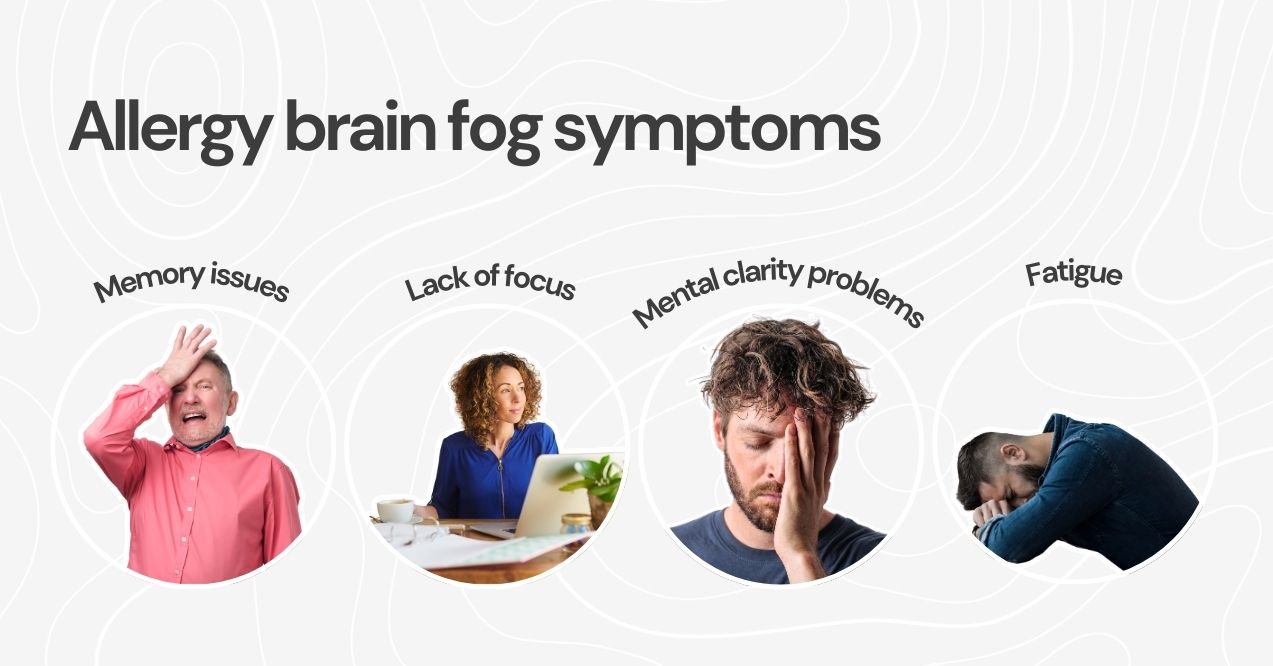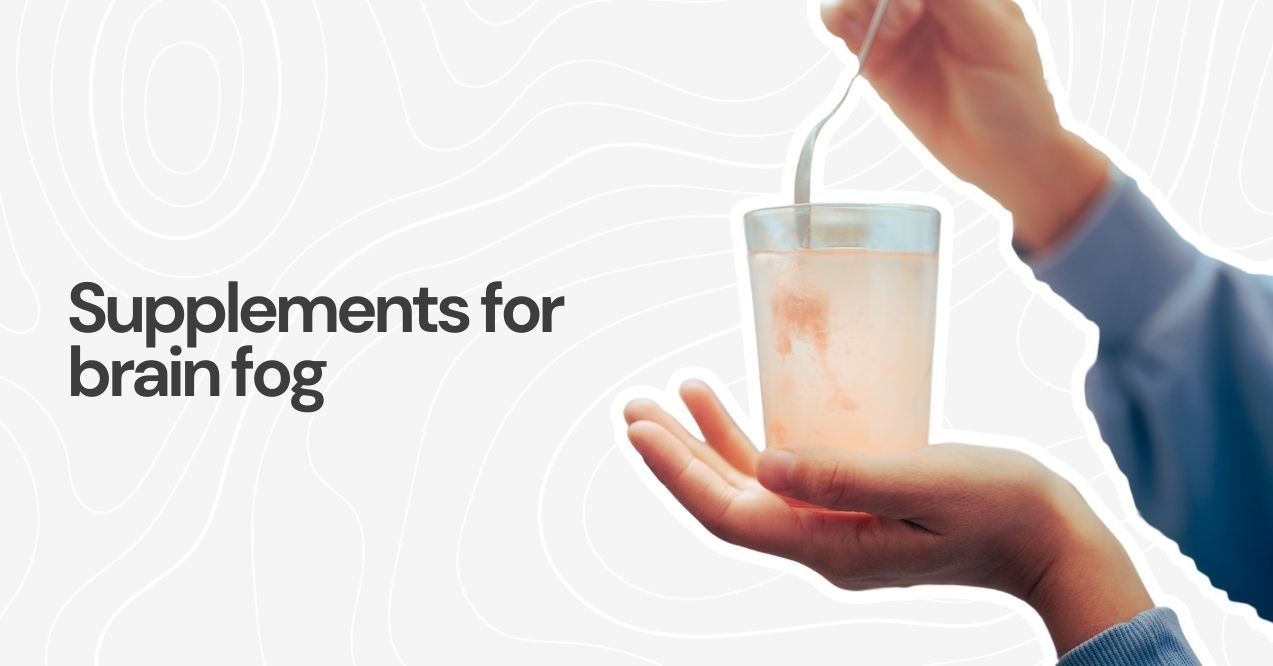Can Allergies Cause Brain Fog? Overcoming Fuzziness
Can Allergies Cause Brain Fog? Many of us experience moments when our minds just don’t seem clear. When you suddenly start to require best supplements for focus and concentration or any of the best supplements for mental clarity, start drinking smoothies for brain fog or look for another way to overcome fuzziness. Interestingly, these moments of fuzziness and brain fog can be connected and caused by allergies. There is a surprising link that could be especially relevant for young adults who might be noticing these symptoms more frequently.
Allergy brain fog symptoms might make it difficult to concentrate, transforming everyday tasks into unwanted challenges. Furthermore, allergies can also lead to body aches and fatigue, adding physical discomfort to the mental haze. Incorporating superfood powders into your diet can help support mental clarity, while performance supplements may aid in reducing fatigue and enhancing overall vitality.
Let’s learn more about this type of brain fog and explore how we can clear it to live our lives to the fullest.
Key Article Findings:
What is Brain Fog?
Before answering can allergies cause brain fog, let’s start from the beginning. Brain fog feels like trying to navigate through a dense fog, but inside your mind. It clouds your clarity and slows down your mental processes, making even simple tasks seem overwhelming. For young adults and students, this can be particularly frustrating, affecting everything from studying to social interactions.
Here are some common symptoms that illustrate what living with brain fog can feel like:
- Memory Problems: Forgetting what you were about to say or do, like losing track of your thoughts during a conversation or blanking out on test answers you’ve studied for.
- Lack of Mental Clarity: Struggling with muddled thoughts, making it hard to grasp concepts or follow instructions you would usually understand.
- Difficulty Concentrating: Having trouble staying focused on homework or lectures, feeling like your attention is constantly diverted.
- Mental Fatigue: Experiencing a sense of mental exhaustion, even after tasks that don’t feel mentally taxing.
For those wondering about other symptoms triggered by allergies, you might ask, “Do allergies make you dizzy?” Let’s explore this further.

Can Allergies Cause Brain Fog?
So, Can Allergies Cause Brain Fog? Research suggests a complex relationship between allergic reactions and brain function, highlighting how the body’s response to allergens can impact mental clarity.
Allergic reactions trigger the release of histamines, chemicals that the body produces to fight off the allergens. These histamines can impact brain function, leading to symptoms of brain fog, such as reduced concentration, memory issues, and a general feeling of mental fatigue. Studies on mice have shown that the inflammatory response induced by allergies can affect the central nervous system, thereby influencing cognitive functions and potentially leading to that foggy feeling.
In addition, allergies can disrupt sleep quality. Symptoms like nasal congestion or the discomfort caused by allergies often interfere with restful sleep, which can lead to heightened brain fog the following day. This lack of quality sleep makes it more difficult to stay focused and alert throughout the day.
You might also wonder, “Do allergies cause dizziness?” This dizziness is often linked to pressure changes in the inner ear, which can occur during allergic reactions. Since the inner ear plays a crucial role in maintaining balance, these disturbances can lead to feelings of dizziness, further complicating the brain fog experience for those dealing with allergies.
Allergy Brain Fog Symptoms

When allergies strike, they bring with them a host of uncomfortable symptoms, including a less talked about but equally challenging condition known as allergy brain fog. This condition can make day-to-day life feel more cumbersome, affecting mental processes in several ways.
Here are some of the typical symptoms associated with allergy-induced brain fog, which may feel similar to casual brain fog:
- Memory Issues: Difficulty recalling information, forgetting recent conversations or tasks, and misplacing items more often.
- Lack of Focus: Struggling to concentrate on tasks, whether it’s work, study, or even leisure activities, leading to decreased productivity.
- Mental Clarity Problems: Experiencing a persistent sense of confusion, as though trying to process thoughts through a haze.
- Fatigue: Feeling unusually tired or exhausted, which can intensify other symptoms of brain fog, making it hard to maintain normal daily activities.
The duration of allergy-induced brain fog varies depending on factors like allergen exposure, the severity of allergies, and overall health. In some cases, symptoms may subside quickly once allergen exposure is reduced, while others may experience prolonged brain fog until their allergies are effectively managed.
Implementing tips for mental clarity or any of the best mushrooms for mental clarity into your daily routine can make a substantial difference. These strategies may include regular exercise, maintaining a balanced diet, ensuring quality sleep, and possibly adjusting your environment to reduce allergen exposure.
How to Alleviate Brain Fog?
1. Reducing Exposure

Reducing exposure to allergens is a key strategy in managing allergy-related brain fog. By limiting contact with common irritants like pollen, dust mites, pet dander, and mold, you can significantly reduce the frequency and severity of allergic reactions, ultimately alleviating cognitive symptoms such as brain fog.
Simple yet effective strategies to minimize allergen exposure include:
- Reducing outdoor activities when pollen counts are high
- Keeping windows closed during high pollen seasons
- Using air purifiers to reduce airborne irritants
- Regularly washing bedding in hot water to remove dust mites
By creating a cleaner, more controlled environment, you can help prevent the onset of allergy symptoms, including brain fog, ensuring a clearer mind and improved focus, leading to a more productive and enjoyable daily life. This also might be a helpful strategy on how to improve mental clarity in general.
2. Antihistamines and Their Use

Antihistamines play a crucial role in managing allergies by blocking the effects of histamine, a chemical released during allergic reactions that contributes to symptoms like sneezing, itching, and nasal congestion.
Here’s how antihistamines work and their relevance to brain fog:
- Improve Quality of Life: With fewer allergy symptoms, individuals may experience better sleep and less daytime fatigue, which can contribute to clearer thinking and reduced brain fog.
- Block Histamine: Antihistamines prevent histamine from binding to its receptors, reducing common allergy symptoms.
- Reduce Symptoms: By minimizing allergic reactions, antihistamines help alleviate nasal congestion, runny nose, and itchy eyes.
For those wondering how to get rid of brain fog migraine, antihistamines may offer part of the solution. By controlling allergy symptoms, these medications can reduce the frequency and severity of migraines that are often linked to brain fog.
It’s important to choose the right type of antihistamine, as some can cause drowsiness, which may impact cognitive function. Consulting with a healthcare provider can help determine the best option for you.
3. Supplements for Brain Fog

In the quest to enhance cognitive function and maintain mental clarity, many turn to dietary supplements as a natural approach. Among these, trumeta metabolic reds stands out for its targeted benefits in supporting cognitive health and alleviating the effects of brain fog. This supplement leverages a blend of nutrients, antioxidants, and specific herbs for mental clarity, aiming to support metabolic health and overall mental alertness and focus.
Trumeta metabolic reds includes key components such as:
- Antioxidants – These help support the brain against oxidative stress, which may contribute to cognitive decline.
- Nutrients – Essential vitamins and minerals that support brain function and energy levels.

As an addition we also suggest trumeta metabolic greens, another supplement designed to support overall health with a focus on detoxification and a blend of herbs for mental clarity.
Individual responses to supplements can vary significantly, and their interaction with medications or existing health conditions should be carefully considered.
Therefore, consulting with a healthcare provider before starting any new supplement regimen is essential to ensure it aligns with your health needs and goals, particularly if seeking to alleviate brain fog and enhance mental clarity.
The Bottom Line
Can Allergies Cause Brain Fog? Brain fog can make everyday tasks feel more challenging, often linked to allergies that trigger confusion, forgetfulness, and difficulty focusing. Research suggests a connection between allergic reactions and cognitive function, affecting mental clarity.
To reduce allergy-induced brain fog, limit allergen exposure with strategies like keeping windows closed and using air purifiers. Supplements like Trumeta’s Metabolic Reds and Metabolic Greens may also support cognitive health.
Always consult with a healthcare provider before starting any new supplement. Addressing allergy-related brain fog is essential for improved focus and overall well-being.
Yes, allergies can cause dizziness. Changes in inner ear pressure during allergic reactions can disrupt balance, leading to feelings of dizziness. This symptom, alongside other allergy-related issues like brain fog, emphasizes the need to address allergies comprehensively for improved overall well-being.
Yes, allergies can cause body aches and fatigue. The body’s immune response to allergens can trigger pro-inflammatory activity, leading to muscle aches and feelings of tiredness. Addressing allergies comprehensively, including managing symptoms like body aches and fatigue, is essential for maintaining overall health and well-being.
Allergies can make you dizzy due to changes in inner ear pressure during allergic reactions. This disturbance affects the balance mechanism in the inner ear, leading to feelings of dizziness. Managing allergies effectively can help alleviate this symptom, improving overall quality of life.
Advertisement. This site offers health, wellness, fitness and nutritional information and is designed for educational purposes only. You should not rely on this information as a substitute for, nor does it replace, professional medical advice, diagnosis, or treatment. If you have any concerns or questions about your health, you should always consult with a physician or other health-care professional. Do not disregard, avoid or delay obtaining medical or health related advice from your health-care professional because of something you may have read on this site. The use of any information provided on this site is solely at your own risk.







